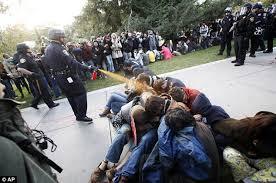Voluntarily giving up power is a rare event. Groups who lack power nearly always have to battle the status quo to gain access to what are later considered basic rights.
History books often gloss over the fact that our Founding Fathers were the colonial elite. They were white men of privilege. Not coincidentally, the document they crafted was a balance of political philosophy and the practical desires of men of wealth to preserve their power and property as much as possible.
For example, in 1789, white American men with property could vote. Nor for that matter did women, free African Americans, slaves, Native Americans...
White men with property had power. White men without property battled this power structure. It took over 30 years but eventually the property requirement was removed. Leftover or newly instituted were poll taxes, literacy tests and other barriers to prevent poor white men from voting.
A total of 131 years passed between the Constitution's approval and the 19th Amendment (allowing women the right to vote) in 1920. For women to gain the right to vote, it required many decades of effort and countless women marching in the streets, demanding their rights from those in power.
While the 15th Amendment granted African-American males the right to vote, barriers such as grandfather clauses, poll taxes, literacy tests, violence and intimidation minimized their turnout. Through the efforts of the Civil Rights era, with African Americans taking to the streets in protest, they slowly began acquiring in the real world the rights that they had on paper. That said, even today legislative barriers exist and are being constructed in some places to minimize African Americans political power.
Teenagers had been fighting in the U.S. military since the colonial days yet it wasn't until the 16th Amendment passed in 1971 that 18 year olds gained the right to vote. Their chanting "old enough to fight, old enough to vote," finally forced the power structure to yield.
Homosexuals had to work against the powerful majority to change the laws that made homosexual acts illegal and the perceptions underlying those laws. For gay couples to obtain the right to marry it took decades of effort, lobbying, marching and campaigning. What seemed nearly impossible in the days of the Stonewall protests now seems to many Americans to be both just and inevitable.
But justice is not inevitable. While today we view those previous restrictions as unfair, at the time they were accepted as just in the minds of the power class. At each step, many in power defended the status quo and their own positions of privilege and their advantages. It took persistent effort by those seeking justice to gain what now seems inevitable.
In 2014, we look at many of those past inequalities as unjust, often struggling to understand why these people were denied equal rights for so long. This begs the question, what will future generations view as unjust in our current society?
These days, inequality is a hot topic. Those who seek to increase the equality of opportunity are battling a power structure where a few privileged have benefited while the majority has lost. Those who believe that the opportunities to achieve success should be open to everyone are struggling against a powerful elite who wants to keep the playing field slanted in their own direction. Those who believe success should be driven by talent and effort need to recognize that the battle for equality of opportunity will be fought for generations. It will require persistence because power nearly always seeks to retain power, it rarely volunteers to share.